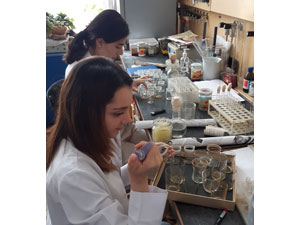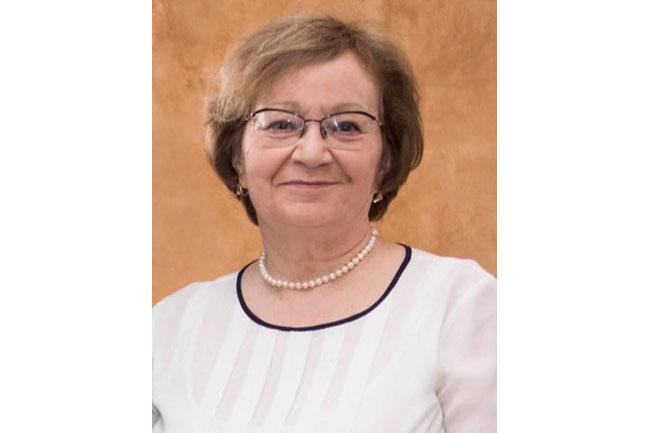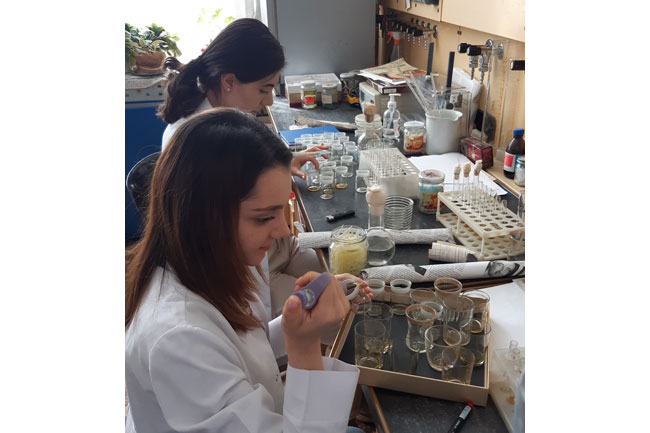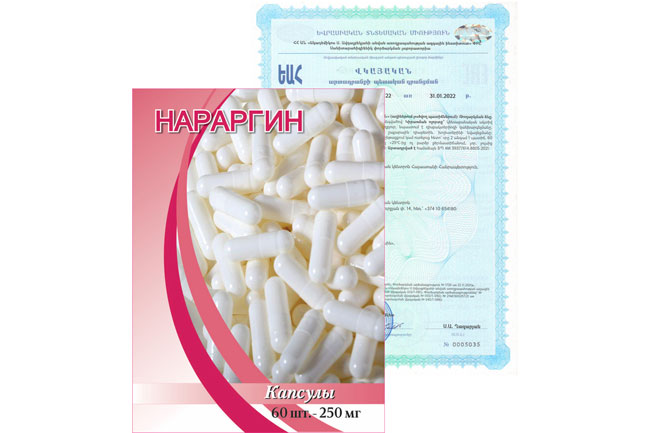| ||||||||
The biologically active food supplement "Narargin" has been developed and officially registered at the Scientific and Production Centre “Armbiotechnology” of NAS RA. It is used to prevent dysbacteriosis, Type 2 diabetes, to maintain and restore the balance of intestinal microflora during antibiotic treatment, and contributes to reducing the level of cholesterol in the blood. The biologically active food supplement "Narragin" is of practical value in medicine for prevention and treatment of certain diseases. It contributes to the restoration of insulin-producing β-cells and stimulation of the secretory function of the pancreas, which is one of the main goals aimed at the treatment of Type 2 diabetes. It regulates and restores the balance of intestinal microflora in the case of antibiotic therapy, as well as dysbacteriosis, it reduces the level of cholesterol in the blood," said Flora Tkhruni, the author of the development of the "Narargin" food supplement, the head of the Probiotics Biotechnology Laboratory of the Scientific and Production Centre "Armbiotechnology", candidate of biological sciences.
"Narargin" was developed on the basis of a consortium of probiotic lactic acid bacteria Lactobacillus acidophilus MDC 9602 (Ep. 317/402) and Lactobacillus rhamnosus БТК 20-12 MDC 9631 with targeted multifunctional properties. These lactic acid bacteria synthesize biologically active products of metabolism - arginine amino acid, extracellular polysaccharides and antimicrobial compounds - bacteriocins, which inhibit the growth of microorganisms that cause food spoilage, bacteria that are multi-resistant to antibiotics. "The unique property of lactic acid bacteria, included in the consortium, to synthesize arginine contributes to the restoration of insulin-producing β-cells and the stimulation of the secretory function of the pancreas, as L-arginine stimulates the release of insulin and increases the sensitivity of β-cells to glucose, which is one of the main goals aimed at the treatment of diabetes", said Flora Tkhruni.
"Narargin" was created within the framework of the project "Study of properties of new probiotic strains for the prevention of certain diseases" implemented by the Scientific and Production Centre "Armbiotechnology" of NAS RA with basic funding. "Narargin" is manufactured in accordance with RA ՏՊ 39377614.8805-2021. In 2022, the biologically active supplement "Narargin" was officially registered and received a state registration certificate No. ԱՄ.01.01.01.003.R000016.01.22. "At present, works are being carried out in the direction of marketing, i.e realization of "Narargin" both in local and foreign markets. Preliminary cooperation agreements have been reached in the direction of introducing Narargin in the Russian Federation and the Czech Republic," said Flora Tkhruni.
Scientific articles on the conducted research were published in highly-cited scientific journals:
The following patents have been obtained:
The research has been positively assessed by the scientific community, including the international experts. Anna Gasparyan, a young researcher of the Laboratory of Probiotics Biotechnology, a student of YSU Pharmacy Institute, has been involved in the research work. |
General Page - About Academy - Divisions - Organizations - Members - Contact us - Structure - Presidium Members
Documents - Innovation Proposals - Publications - Funds - Conferences - Competitions - International cooperation
Youth programs - Photogallery - Videogallery - Web Resources Other Academies - "Gitutyun" newspaper - "In the World of Science" Journal
Publications in Press - Notices - Anniversaries - Universities - News - Scientific Results - Scientists of the Diaspora
Young Scientist Tribune - Our Honored Figures - Announcements - Sitemap - Search



